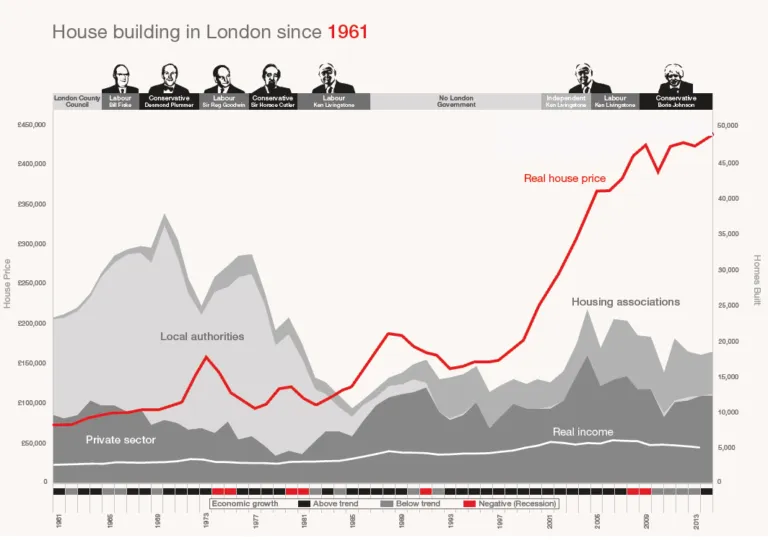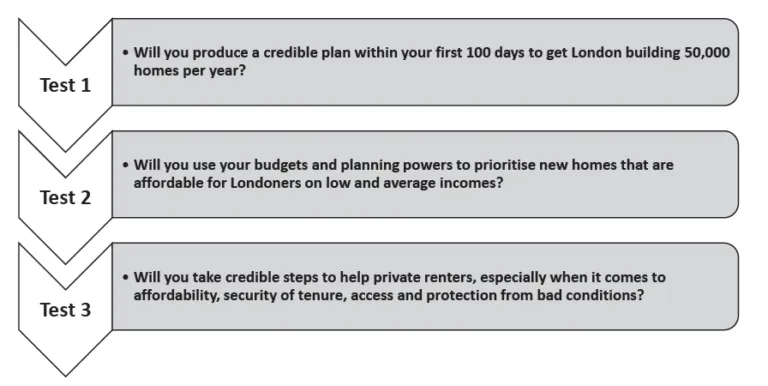Three tests for the next Mayor of London
Published: by Pete Jefferys
Over the next six months, Shelter will be running campaigns aimed at the upcoming 2016 London Mayoral contest. Today, we are introducing three tests that we want all the candidates for Mayor to meet when they set out their policies. If they fail these tests then we can expect – at best – more of the same: rising rents, increasing homelessness and rapidly falling ownership. If they pass, they will be on the way to creating a fairer, better city.
London is, of course, the part of England with the most acute housing crisis: rents and house prices are more than double the averages for England as a whole. Tens of thousands of children are living in temporary accommodation, waiting for a real home. In our face-to-face services we are hearing more and more often from people who just don’t feel they have any realistic options left to stay in the capital: forcing them to leave their families and their job. More broadly, more than a quarter of Londoners are living in poverty after housing costs, according to recent work by NPI.
London is unique within England in having strongly devolved housing budgets and planning powers, meaning that the London Mayor has far greater influencing over housing in the capital than leaders in any other city or region. The next Mayor can really make a difference to the situation.
However, they do face a huge challenge.
London’s population is growing 100,000 a year but the capital builds less than 25,000 homes each year (see below). The Mayor’s own detailed assessment of housing need is very clear. Our first test if for the Mayor to double building levels to around 50,000 homes a year over the long term to make housing affordable.
The official assessment is also clear that with so many Londoners on low or variable wages a large proportion of these homes must be at low rents. If they’re not genuinely affordable, they simply won’t meet London’s need. That’s why our second test is that all the Mayor’s budgets, initiatives and planning powers must be focused on driving up the number of genuinely affordable homes for Londoners on low and average incomes.
Ultimately, we need these genuinely affordable homes to solve London’s homelessness crisis. At Shelter we speak every day to families stuck in temporary accommodation, or renting in appalling conditions in London because they have no better options. The next Mayor must build good quality, low rent homes to help these families.
As well as building more affordable homes, it is vital for the next Mayor is to focus on helping those who are stuck renting. Early in the premiership of the next Mayor, private renting will become the single largest tenure in London. There will be more private renters than owners with mortgages for the first time in decades. The next Mayor must be bold, credible and reforming – using their platform to argue for powers to materially improve the lives of renters. We don’t want to see gimmicks or toothless, voluntary schemes – we want strong policies that make renting more affordable and more secure, but don’t risk an increase in evictions. We’ll be presenting some ideas through the course of the campaign.
Put together, these challenges give us our three tests for the Mayoral candidates.
During the course of the campaign we’ll put forward proposals for better renting and more affordable homes, but ultimately we’ll be open minded in looking at the ideas from all the campaigns to see if they meet our tests. We’ll also keep making the case to national government to protect the safety net (which they are responsible for) which is so vital for Londoners at risk of homelessness and minimise the loss of affordable homes from London as a result of Right to Buy.
With housing the number one issue for Londoners in the polls it’s going to be a critical few months for all the Mayoral campaigns. We’ll be holding them to account to deliver what Londoners need.

